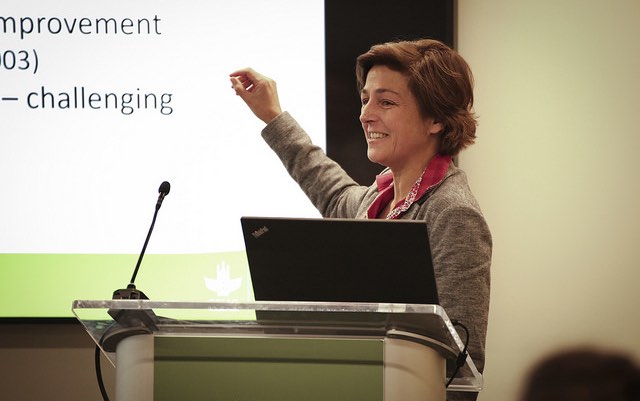As the world becomes more aware of the growing threats to our natural resource base—climate change, population growth, urbanization, and much more—researchers need to think deeply about how the questions they ask and the tools they employ help address complex questions about sustainable agriculture practices and principles. This was a cross-cutting issue tackled by participants at a recent IFPRI policy seminar—Managing natural resources for sustainable production systems: A research agenda at the crossroads.
Sara Scherr, president and CEO of EcoAgriculture Partners, put a fine point on this challenge by highlighting changes in how natural resource management (NRM) has evolved as a topic of concern in recent decades. She noted that the research agenda has moved away from treating NRM as the domain of individual farms to a mosaic landscape that overlaps with urban spaces, industry, and diverse communities. While agriculture often sits at the center of these landscapes, greater recognition and participation from other elements of society and the economy need to be “the central feature of ecosystems management,” Scherr said. Only by building a broader understanding of ecosystems will responsible stewardship advance our efforts to meet the UN Sustainable Development Goals.
And only by evaluating what works in improving natural resource management will such goals be achieved. “It’s essential to examine both the social and environmental effects of conservation-oriented farming methods,” said Karen Macours, a professor at the Paris School of Economics and chair of the Standing Panel on Impact Assessment (SPIA) of the CGIAR Independent Science and Partnership Council (ISPC). “When we think of impacts, that obviously has to be at the core of what we do,” she said, pointing to the need not just for evaluations of past project impacts, but also to adjustments and improvements in how future projects are designed and assessed.
SPIA Agricultural Research Officer James Stevenson highlighted this challenge with a review of recent studies commissioned to measure and better understand adoption patterns around six major NRM practices, including alternate wetting and drying of rice in Viet Nam, micro-dosing fertilizer in Niger and Zimbabwe, and agro-forestry in Zambia. The findings were sobering: Despite some promising results, relatively low rates of adoption were observed for many of the practices.
A key reason for that, he said, was that farmers saw little opportunity for profit. “There has to be something driving adoption. In the absence of a financial incentive for a farmer to actually adopt [these practices] we will see low adoption,” Stevenson said. He suggested, at a minimum, that project designers should avoid prioritizing land productivity over profitability. This approach, he said, is not only important to accelerating adoption rates, but to also sustaining adoption over time.
Macours said that the current moment calls for changes in both the perceptions and methodology of NRM research. Given that farmers and communities make choices about NRM practices and principles via non-linear processes, she said, she invited panelists and the audience to think more about the different steps in the causal chain from research to implementation. She argued that it is not sufficient to merely design research methodologies, test impacts, and then attempt to put findings into widespread use. Rather, she saw the urgent need to “consider how farmers perceive the technology,” and incorporate those social insights in analyzing impacts. Panelists and participants echoed these insights, resulting in a rich discussion around next steps and innovative ideas for the NRM research agenda.
Shelleka Darby is an IFPRI Communications Intern.







